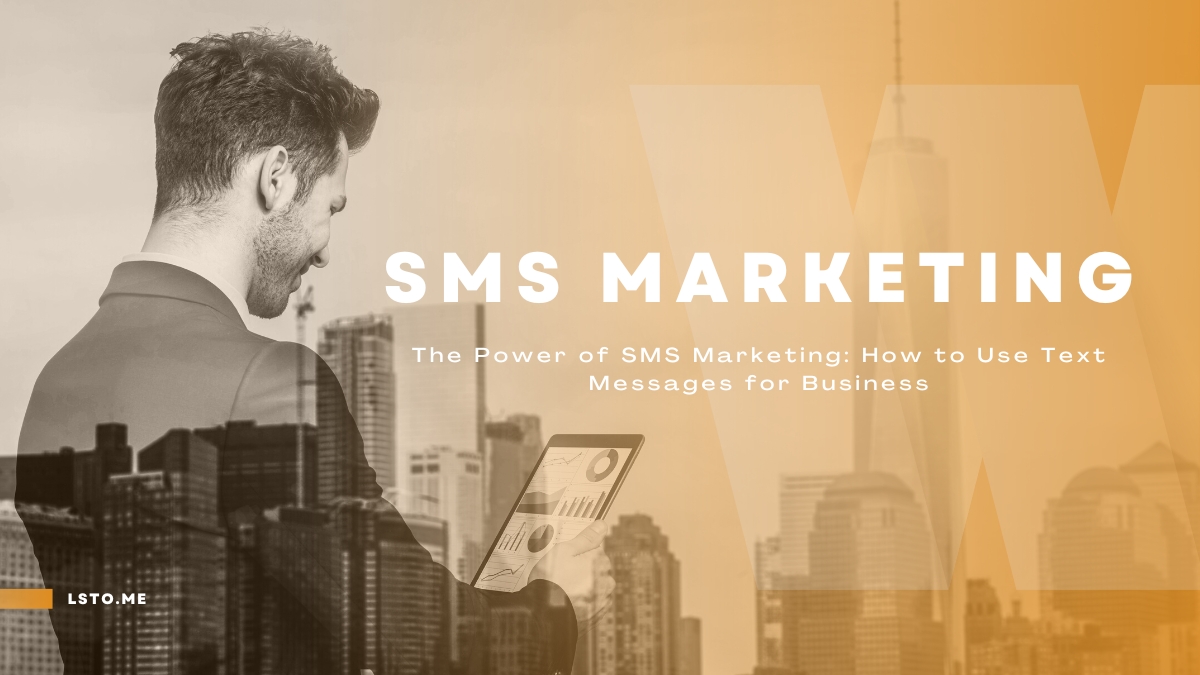
Text message marketing is quickly becoming one of the most powerful tools for businesses. With billions of text messages sent around the world each day, SMS marketing has an incredible reach and potential to help businesses grow their customer base and generate revenue. In this article, we’ll explore the power of SMS marketing and how companies can use it effectively to promote their products or services.
1. Building an Opt-In List
SMS marketing has revolutionized the way businesses reach their customers. Through this type of marketing, businesses can send quick and targeted messages directly to their consumers’ phones, allowing them to quickly inform them about promotions, product updates, store openings, and more. To effectively use SMS marketing, however, it is important for businesses to first build an opt-in list of customers.
An opt-in list is a collection of phone numbers from individuals who have permitted for a business to send them text messages or promotional materials. Customers are typically asked to provide their consent by either texting a keyword to a short code number or clicking on a web link that will add them to the list. These lists allow businesses to ensure that they are only sending out messages that the customer wants and that they can track which campaigns have been successful in reaching their target audiences.
2. Creating Engaging and Personalized Messages
When it comes to SMS marketing, having an effective campaign is paramount. To get the most out of your efforts, you must create engaging and personalized messages that are tailored to your target audience. This means putting in the extra effort to craft relevant content with a personal touch.
By tailoring each message to specific individuals or groups, you can make sure they are compelling and relevant while also boosting engagement. Utilizing data such as customer profiles and purchase histories can help you create more meaningful messages that speak directly to the needs of your customers. Additionally, injecting personality into communications will help build relationships with customers, making them feel like valued members of your community.
Overall, creating engaging and personalized messages for SMS marketing campaigns requires additional time and effort but can pay off immensely in terms of customer engagement and loyalty.
3. Setting up Automated Campaigns
SMS marketing can be an effective way to communicate with customers promptly. Automated SMS campaigns are a great option for businesses looking to send updates, announcements, and promotional messages without having to manually input the information every time. Setting up automated campaigns can save time and resources while still providing valuable communication to customers.
Once set up properly, automated SMS campaigns are easy to maintain and can be scheduled ahead of time so that customers receive the most relevant messages at just the right moment. Businesses have control over how often they send messages and when those messages should go out, ensuring that the audience doesn’t get overwhelmed or inundated with too many communications. Additionally, using an automated system allows businesses to track analytics of customer interactions with their messaging campaigns – such as open rates and CTRs – providing invaluable insights on customer engagement.
4. Compliance with Regulations
SMS Marketing has become an incredibly popular marketing tool for businesses, allowing them to quickly and efficiently reach customers. However, businesses need to remain compliant with regulations when using SMS marketing. This includes both the TCPA (Telephone Consumer Protection Act) and CAN-SPAM Act (Controlling the Assault of Non-Solicited Pornography And Marketing).
The TCPA regulates how marketers can use automated phone calls and text messages, while the CAN-SPAM Act sets guidelines for sending commercial emails. To remain compliant, businesses must obtain permission from consumers before sending any marketing texts or emails. Additionally, they must give consumers a way to opt out of further communications and identify themselves in all messages sent. Failing to comply could lead to fines or penalties from both state and federal regulators.
5. Transactional Messages
SMS marketing is a powerful tool in the digital marketer’s arsenal. It allows businesses to quickly and easily reach customers via text message and drive engagement with their products or services. Transactional messages are an important component of any SMS marketing strategy, as they can be used to improve customer satisfaction and engagement.
Transactional messages include appointment reminders, order confirmations, shipping notifications, product recalls, promotional offers, and more. By providing timely information to customers via SMS messages, businesses can ensure that their customers are aware of recent orders, upcoming appointments, or other important updates related to their product or service delivery. Additionally, transactional messages help build trust between a business and its customer base by providing timely communication about important events related to their purchase journey. This ultimately leads to higher customer satisfaction levels which can lead to increased loyalty and word-of-mouth referrals for businesses.
Conclusion
SMS marketing is a great way to reach out to customers and potential customers. It’s an easy, convenient way to keep people informed of upcoming deals, promotions, events, and more. It helps businesses stay connected with their target audience and build relationships for long-term success. With the right strategy in place, SMS marketing can help drive engagement and increase sales. To start leveraging the power of SMS marketing for your business, it’s important to understand best practices and regulations.